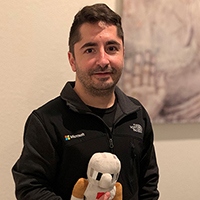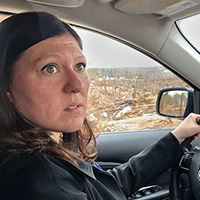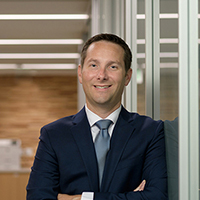 The Indiana Statehouse Series brought policy experts from the Purdue University Research Center in Economics (PURCE) together with Indiana lawmakers to discuss topics including education, healthcare and unemployment. (Photo provided)
The Indiana Statehouse Series brought policy experts from the Purdue University Research Center in Economics (PURCE) together with Indiana lawmakers to discuss topics including education, healthcare and unemployment. (Photo provided)
Bridging the Gap
PURCE Statehouse Series brings research to Indiana lawmakers
Krannert School of Management faculty are engaged in important, interesting and impactful research. But often this research reaches only a narrow readership, that of niche academic journals.
Krannert’s Purdue University Research Center in Economics (PURCE) aims to bring the findings of empirical economic research to a larger audience. To help fulfill its mission, the center planned and hosted a series of live virtual information sessions specifically for Indiana decision makers, choosing topics of importance to the 122nd Indiana General Assembly.
"Policy-relevant research frequently fails to make the jump from the academic journal into the hands of policymakers, and these information sessions with state government leaders have been an effective way to bridge the gap,” says Kevin Mumford, associate professor of economics and Kozuch Director of PURCE.
PURCE is a non-profit research center home to select Krannert faculty who create and share data-driven insights into how laws, regulations and government programs affect the market economy and the well-being of individuals and society.
Mumford and PURCE staff planned the six-part webinar series in partnership with Purdue’s Office of Government Relations. Indiana’s elected officials, government agency staff and key state-level decision makers were invited to the 50-minute virtual sessions. PURCE wanted to encourage an intimate, workshop-style atmosphere that allowed for robust discussions.
Starting in January 2021 and concluding in early April, the series offered research presentations and discussions by the following faculty on carefully chosen topics:
- Jillian Carr, PURCE faculty affiliate and assistant professor of economics, on offering college entrance exams for free to high school students. Colleges across the U.S. are becoming “SAT optional,” and Carr looked at the concerns that led to these decisions. Many standardized tests have known pitfalls that leave vulnerable students behind, for example.
- Miguel Sarzosa, PURCE faculty affiliate and assistant professor of economics, on COVID-19 related K-12 student remediation. For children unable to attend school due to the pandemic, cognitive, emotional and physical development stalled. The gap is larger for children from relatively poor households. Sarzosa considered possible remediation efforts that could be undertaken to put children back on the right developmental path and close the inequities brought by the pandemic.
- Kevin Mumford on how COVID-19 has affected employment. Between March and April 2020, the unemployment rate in Indiana spiked from 3.0 to 17.5 percent, with job losses concentrated in specific industries. Some of these jobs are not likely to come back, even after the pandemic is over. Mumford discussed the government response to and effects on the nature of economic recovery.
- Roberto Gallardo, Director, Purdue Center for Regional Development and C&RE Specialist, Purdue Extension, on broadband adoption in rural communities. COVID-19 brought into sharp relief the importance of fast, reliable internet access and the gap between those residents who have that access and those who do not. Gallardo presented recommendations to better position Indiana to achieve digital inclusivity.
- Victoria Prowse, PURCE faculty affiliate and associate professor of economics, on the cost and effectiveness of unemployment insurance in the time of COVID-19. Unemployment rose sharply and unexpectedly during the COVID-19 pandemic, causing a drastic reduction in earnings for many households. Prowse examined the unprecedented importance of unemployment insurance during the pandemic.
- Susan Lu, associate professor of management, on state regulations of telemedicine visits. Telemedicine has become more common given the current global pandemic. Lu gave an overview of telemedicine, its effectiveness and obstacles, and policies in the time of COVID-19 and beyond.
This is the second series of information sessions PURCE and university government relations have hosted. The first, offered in February and March 2020, featured three in-person presentations at the Statehouse in downtown Indianapolis. This year, the series was moved online in accordance with pandemic-related safety procedures, and PURCE doubled the number of sessions.
The center intends to continue offering these valuable discussions during future legislative sessions.
“Our primary goal is that the increased interaction between Purdue professors and government leaders will lead to better government policies for Indiana,” says Mumford.
Indiana State Senator Shelli Yoder attended several webinars in the series and appreciates the “practical takeaways.” She also noted that there is a level of trust built into research presentations hosted by Purdue.
“There’s a great deal of oversight that comes out of a university,” says Yoder. “To be able to know there aren’t ulterior motives or politics associated with it, that’s why I kept signing up.”
Mumford echoes that notion: “Our state government leaders want to make evidence-based decisions, and we provide a reputable and unbiased source of this evidence.”
PURCE provided webinar attendees follow-up materials, from a recording of the webinar to written summaries with key takeaways to links to additional resources.
Charity Flores, Chief Academic Officer for the Indiana Department of Education, found Sarzosa’s presentation especially helpful and timely. His research-supported suggestions for K-12 remediation “sparked conversations within the Department about providing information to schools and corporations as they consider continued learning efforts,” Flores says.
A two-page summary of Sarzosa’s presentation, outlining five steps K-12 educators should take to address COVID-19 related learning loss, was particularly helpful.
“We have a subgroup of Department staff formalizing additional guidance for schools and corporations on accelerating learning,” Flores says. “This document served as a key resource as we determined next steps.”
In some instances, webinar attendees asked for follow-up virtual meetings; several faculty members and PURCE’s director met with state agency leaders to further share expertise.
“Faculty were engaged and willing to support our efforts,” says Flores. “Miguel highlighted some important areas that we are including in our guidance specifically related to social emotional learning and the potential impact on students’ academic needs.”
Purdue alumnus Byron Ernest, a member of the Indiana State Board of Education, found Carr’s comprehensive survey of the college entrance exams issue valuable.
“It is always important to look at what other states are doing when making decisions to review data, get ideas, find out things that worked, and more importantly, anything that did not work,” Ernest says.
His attendance at and participation in Carr’s session led to more meetings. Ernest requested a discussion of how a value-added or predictive measures approach could be used to create more realistic goals for schools related to SAT scores for students.
“I would like for our state board of education to work with the faculty to help us use all data in order to demystify the complexity of issues surrounding education in Indiana. We need to find ways for our data to tell a complete story,” he says.
Faculty expertise is integral in meeting that need. “I greatly value the relationship I have formed with Dr. Mumford and Dr. Carr,” Ernest says. “They have become valuable thought partners.”










